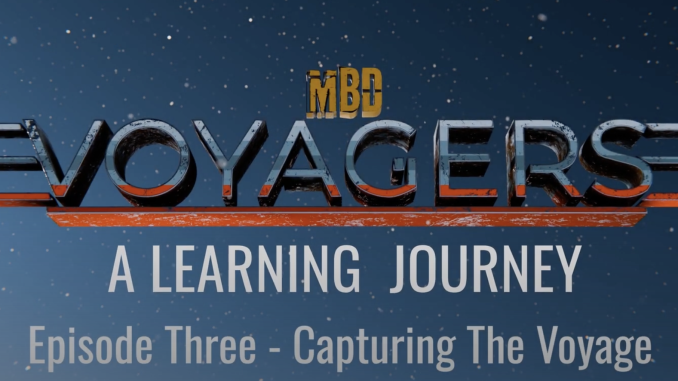
DAHL topic: should Arts and Humanities education be more like the methods used for learning in the creative digital industries?
To explore this question, we need to understand more about how creative digital industries tend to learn and innovate (the two things overlap). And then consider if similar strategies are used in Arts and Humanities education, what they add, and where they might be used more often.
The immersive experience, VR, and film making company MBD, have recently posted a series of videos on Youtube, documenting a creative project that they have undertaken. MBD decided to set themselves a challenge that would stretch their capabilities, collectively learn new techniques, share their learning and build their team. With support from The Space, MBD took a rare opportunity to focus on their own development, and see where the voyage led.
So the work wasn’t in direct response to a commission. They did get funding from The Space, for some of the costs. They did do a pitch for this, which is an important thing to do for creative practice – it concentrates minds, ideas, effort, and sieves out that which is inessential, uninteresting, unfeasible etc.
This is not an unusual strategy in creative digital, although MBD are especially good at it. We can all learn from their approach. In the videos they reflect on this process and what they learned. Having worked with MBD, I know that the project would have been rich with reflective practiceStanding back from your work and considering what is going well, what not, how you might do things better, or do different things, and what you can learn from experiences. Much of what we think about reflective practice comes from the philosopher Donald Schön's research into successful practitioner... More and learning. And they will feed what they have learned out to many people to build the wider “ecosystem” of creatives locally and globally. Some of that learning is technical. But much of it is about the process and how to bring the diverse skills together to make the project work. Now they have completed it, they have a good idea on how the type of project might be applied, repeated, varied.
This kind of stretch-challenge, and reflective practiceStanding back from your work and considering what is going well, what not, how you might do things better, or do different things, and what you can learn from experiences. Much of what we think about reflective practice comes from the philosopher Donald Schön's research into successful practitioner... More, is an important approach we can all learn from, whether we are in the creative digital industries, academia, or elsewhere.
Companies, and people, working in the creative digital industries try to operate at the sweet-spot between doing work that is:
- familiar, established, well-understood, reliable, using predictable practices, techniques, and technologies;
- emerging, unfamiliar, not-entirely-understood, unpredictable, but potentially leading to worthwhile innovations.
Smart companies and people (that I have observed) have a meta-reflective appreciation, maintained by frequent reflective dialogue with trusted people, of how they are maintaining that balance so as to keep moving forwards, but also to ensure a solid foundation and reliable sources of success.
The formula for this varies. Some have, in effect, a “day job” that brings in work, but leaving enough time for more risky innovative work relatively isolated from the day-to-day, but with the potential to feed into or even completely transform operations.
Other organisations lean more towards knowledge generation and consultancy, where their day-to-day work is advising and supporting others, using knowledge and experience generated through experimental work and research. R&D consultancy companies can sometimes thrive by doing experimental work for other companies and organisations, using these opportunities to build their own capabilities and reputation. Limina Immersive (another VR company I have researched with) started off by undertaking a big and very successful self-commissioned challenge (creating and running a VR theatre location in the heart of Bristol). They did this from the outset with a designerly research approach from the outset, ensuring that they learned as much as they could, in tight cycles of design-implement-reflect-redesign. More recently they have worked on a broad range of research and design commissions, so as to build knowledge across the complex and continuously evolving field of VR. That has included more conventional desk based research, working with audiences, and even designing a VR centre for Oxford University.
Companies like MBD and Limina also deliberately cultivate a relationship with a wider “ecosystem” of people and organisations into which new knowledge and innovations are fed. In the case of MBD, they are funded (wisely) by Arts Council England to do just that. They have given us a lot of support and advice for free. That is helping us to develop an understanding of immersive tech and how it fits with what we do at Warwick. In turn that could help to develop projects, perhaps with funding, that make the most, or even extend, the MBD approach. It will help to establish immersive tech and experiences as a common practice.
Voyagers playlist:
Interview with Catherine Allen, CEO of Limina:

Leave a Reply